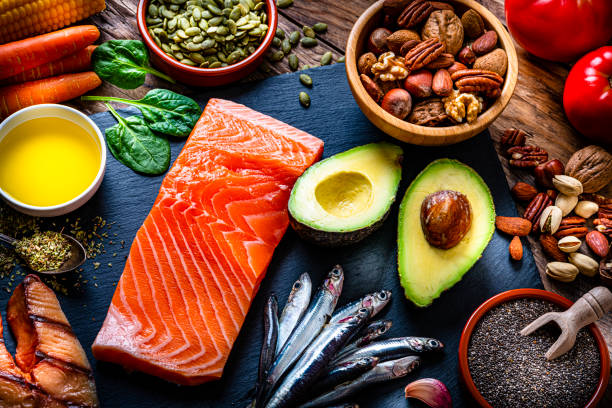Endocannabinoid, General, Health, Pain
How diet effects your Endocannabinoid System
The endocannabinoid system (ECS) is a complex network of receptors, enzymes, and endocannabinoids that play a crucial role in regulating various physiological processes, such as mood, appetite, pain sensation, and inflammation. Recent studies have shown that diet can significantly affect the ECS and its functioning. In this article, we will explore the link between diet and the endocannabinoid system and how you can optimize your diet to improve ECS function.
The Role of the Endocannabinoid System in the Body
The endocannabinoid system is involved in regulating several physiological processes in the body. It consists of two main receptors, CB1 and CB2, that are found in different parts of the body, including the brain, central nervous system, immune system, and peripheral tissues. The CB1 receptors are predominantly found in the brain and are involved in regulating mood, appetite, and pain sensation. The CB2 receptors are mainly located in the immune system and are involved in modulating inflammation and pain.
Endocannabinoids, which are produced by the body, bind to these receptors to activate them and initiate a cascade of physiological responses. The ECS is also influenced by external factors such as diet, exercise, and stress.
Diet and the Endocannabinoid System
Dietary factors can affect the ECS in multiple ways. For instance, the consumption of certain nutrients, such as omega-3 fatty acids and antioxidants, can improve ECS function. On the other hand, a diet high in saturated fats and sugars can impair ECS function.
Omega-3 Fatty Acids
Omega-3 fatty acids, which are found in fatty fish, flaxseed, and walnuts, are known to have anti-inflammatory properties. Studies have shown that omega-3 fatty acids can increase the production of endocannabinoids and enhance the activity of the CB1 and CB2 receptors. This, in turn, can improve mood, reduce inflammation, and alleviate pain.
Antioxidants
Antioxidants, such as those found in fruits and vegetables, can also improve ECS function. These compounds protect the body from oxidative stress, which can damage cells and impair physiological processes. By reducing oxidative stress, antioxidants can improve the activity of the CB1 and CB2 receptors and increase the production of endocannabinoids.
Saturated Fats and Sugars
A diet high in carbohydrates and sugars can impair ECS function. Studies have shown that consuming a high carb diet can reduce the expression of CB1 receptors in the brain, leading to a decrease in endocannabinoid signaling. High sugar consumption can impair the production of endocannabinoids and reduce the activity of the CB1 receptors.
How to Optimize Your Diet for the Endocannabinoid System
To optimize your diet for the endocannabinoid system, it is essential to focus on nutrient-dense foods that are rich in omega-3 fatty acids and antioxidants. Here are some tips to get you started:
- Eat fatty fish, such as salmon, mackerel, and sardines, at least twice a week to increase your intake of omega-3 fatty acids.
- Incorporate plant-based sources of omega-3 fatty acids, such as flaxseed, chia seeds, and walnuts, into your diet.
- Eat a variety of fruits and vegetables to increase your intake of antioxidants.
- Limit your consumption carbohydrates and sugars by avoiding processed foods and sugary drinks.
- Consider supplementing your diet with omega-3 fatty acid and antioxidant supplements.
Conclusion
The endocannabinoid system is a complex network of receptors, enzymes, and endocannabinoids that play a crucial role in regulating various physiological processes in the body. Diet can significantly affect the ECS, with certain nutrients improving its function
citations:
Di Marzo, V. (2018). New approaches and challenges to targeting the endocannabinoid system. Nature Reviews Drug Discovery, 17(9), 623-639. https://doi.org/10.1038/nrd.2018.115
Freund, T. F., Katona, I., & Piomelli, D. (2003). Role of endogenous cannabinoids in synaptic signaling. Physiological Reviews, 83(3), 1017-1066. https://doi.org/10.1152/physrev.00004.2003
Russo, E. B. (2011). Taming THC: potential cannabis synergy and phytocannabinoid-terpenoid entourage effects. British Journal of Pharmacology, 163(7), 1344-1364. https://doi.org/10.1111/j.1476-5381.2011.01238.x
Simopoulos, A. P. (2002). Omega-3 fatty acids in inflammation and autoimmune diseases. Journal of the American College of Nutrition, 21(6), 495-505. https://doi.org/10.1080/07315724.2002.10719248
Tambaro, S., & Bortolato, M. (2012). Cannabinoid-related agents in the treatment of anxiety disorders: current knowledge and future perspectives. Recent Patents on CNS Drug Discovery, 7(1), 25-40. https://doi.org/10.2174/157488912798842269
Verty, A. N., McGregor, I. S., & Mallet, P. E. (2009). The dopamine receptor antagonist SCH 23390 attenuates feeding induced by Delta9-tetrahydrocannabinol. Brain Research, 1268, 40-45. https://doi.org/10.1016/j.brainres.2009.02.033I hope these citations help support the information in the article and provide you with additional resources for further reading.

